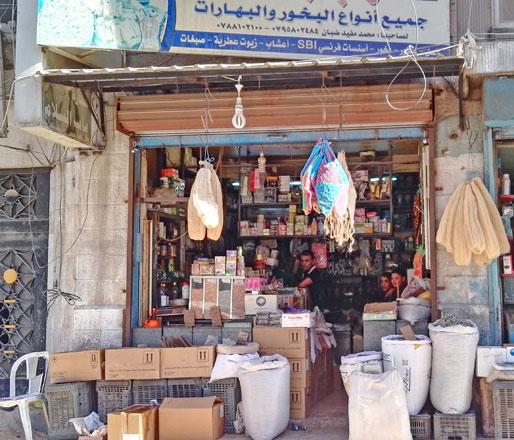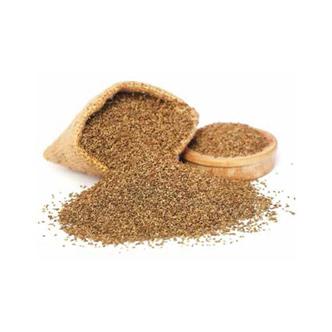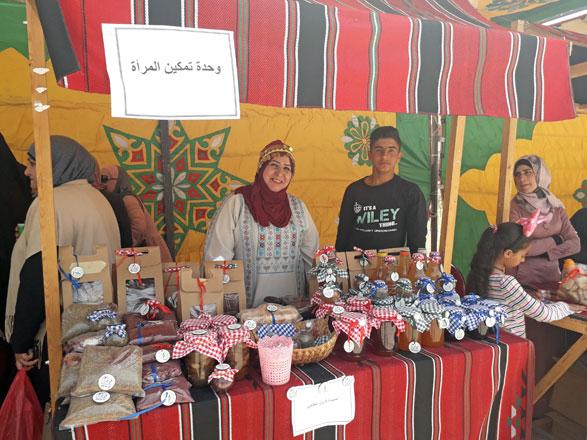You are here
Apothecaries sustain dying art of traditional medicine
By Bahaa Al Deen Al Nawas - Jul 05,2016 - Last updated at Jul 06,2016

An apothecary shop is seen in downtown Zarqa in this recent photo (Photo by Bahaa Al Deen Al Nawas)
ZARQA — Some residents suffering from ailments and sicknesses will visit the local apothecary rather than a doctor to cure them, but the ancient practice is a dying art.
An apothecary is a practitioner of traditional medicine. They can be found running apothecary shops full of herbs and seeds, which are a common sight in the downtown areas of Amman and Zarqa.
Mohammad Daban, the 47-year-old owner of Bab Al Salam apothecary in downtown Zarqa, sells herbs, seeds, spices, essences, soaps, healing soils and oils, and a diverse selection of other loosely related items.
Daban has been managing the shop since the 1980s, since before his father passed away.
Traditional medicine is defined by the World Health Organisation as "the sum total of the knowledge, skills, and practices based on the theories, beliefs, and experiences indigenous to different cultures, whether explicable or not, used in the maintenance of health as well as in the prevention, diagnosis, improvement or treatment of physical and mental illness".
Daban said the younger generation in Jordan is losing interest in traditional medicine.
"The older generation is different from the current one. This generation does not know much about the things I sell; they only know if their grandfather or grandmother for example sent them here to buy something for them", Daban told The Jordan Times in a recent interview.
Usually, most of his customers come to the shop to buy herbs and seeds, but in the fasting month of Ramadan, which concluded on Tuesday, demand increased for flavour essences, used to make home-made juices, and spices to use in cooking for the fast-breaking iftar meal, the shopkeeper said.
Customers seeking healing buy different kinds of herbs like alkanna, sage, chamomile and pear leaves, Daban said, adding that he asks customers what they are using the herbs for so that he can advise and warn them about possible side effects.
Aside from healing, people also buy items related to superstitions, like incense and the blue "evil eye" beads used to repel envy, believing that lighting incense or carrying the beads helps drive away the evil energy emitted by envious or jealous people.
Although Daban sells these items most days, he said that demand has fallen for his brand of healing.
But tokens to repel envy and certain herbs are still in demand, and these days he has to import them from Egypt and sometimes Saudi Arabia, Daban said, adding that he also brings in Dead Sea soil used for medicinal purposes.
The Bab Al Salam owner said he used to import items from Syria, but cannot anymore because of the crisis.
He has been unable to find alternatives for some herbs unique to Syria, he added.
Many foreigners come to the shop, including Moroccans, Sudanese and Algerians, Daban said, adding that tour guides sometimes bring tourist groups who take photos and buy Dead Sea salts and soils, incense and spices.
He added that the profession is usually handed down through the generations. He learned it from his father, who in turn learned it from his father and so on.
"My son, Maher, is a Tawjihi [the General Secondary Education Certificate Examination] student, and he likes the profession and aspires to major in 'Arabic medicine' in order to help run the shop," Daban said, adding that his son wants the degree so he can officially provide medical prescriptions to customers.
Related Articles
CAIRO — In an economic crisis that has led to a shortage of medicines, Egyptians are skipping trips to drug stores, and instead turning to h
By Sheela ShethFood Expert Popularly known as Ajwain or Carom, Bishop’s weed is an annual herb that belongs to the family of Apiaceae o
JERASH — Minister of Industry, Trade and Supply Tareq Hammouri on Wednesday opened the “Jerash Mouneh Exhibition”, an event where members of


















